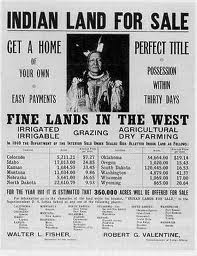June 2, 1924, Congress granted citizenship to all Native Americans born in the U.S. Yet even after the Indian Citizenship Act, some Native Americans weren't allowed to vote because the right to vote was governed by state law. Until 1957, some states barred Native Americans from voting. In our history American Indians were discriminated.
Wednesday, December 21, 2016
Ava's AP American Blog: LAD #25
This act was in regard to the Native Americans and consisted of 11 sections apporved by Congress in 1887. It gave the president the right to take traditional Indian tribal lands and divide it up into allotments for individual Indians in Oklahoma. Specific guidelines were to be followed. Specifically, an Indian would have to abandon their tribe and their culture and the Secretary of Interior who would be in charge of these lands, would select a plot for them to settle on. The Indians had to abandon their way of life and tradition in order to recieve the land. Also, excess land was bought up and allowed to be purchased by non Indian settlers to move onto in the Oklahoma region, a place originally reserved for the Indians. This was an attempt at total assimilation by the United States.
Ava's AP American Blog: LAD #24
In this speech William Jennings Bryan addresses the economic problem of currency that was a prominent issue. Jennings Bryan believed that the distribution of silver 16x more than gold was foolish and would lead to many more problems. Granted, he was a businessman so this idea of continuing to issue gold in larger quantities than the Populist Party was bias, but Jennings Bryan was the voice for the hard working businessmen who were going to be hurt if this new 16:1 ratio of silver to gold were to happen. Lastly Jennings talks to the fact that the gold standard needs to remain strong during a time where the United States was not at its strongest.
Sherman Silver Purchase Act, 1890, passed by the U.S. Congress to supplant the Bland-Allison Act of 1878. It not only required the U.S. government to purchase nearly twice as much silver as before, but also added substantially to the amount of money already in circulation.

Ava's AP American Blog: LAD #23
 Populist Party's platform was a preamble to gain appeal from the people and condemn the slums called cities. Populists represent the common man and their goal was to protect him. The most powerful tool the workers had was blocked by businessmen which is why populists stepped in. Populist voiced their opine that silver should be used in currency which was currently restricted by the government to keep the wealthy. Agriculture produced billions of money but the current system prevented this process of silver. Workers began to rely on a type of currency that was not recognizable by the government. The platform stated that the government should own and operate infrastructure. The Populists felt that land shouldn't be monopolized by foreigners for business speculation but for rightful owners to be used to create wealth.
Populist Party's platform was a preamble to gain appeal from the people and condemn the slums called cities. Populists represent the common man and their goal was to protect him. The most powerful tool the workers had was blocked by businessmen which is why populists stepped in. Populist voiced their opine that silver should be used in currency which was currently restricted by the government to keep the wealthy. Agriculture produced billions of money but the current system prevented this process of silver. Workers began to rely on a type of currency that was not recognizable by the government. The platform stated that the government should own and operate infrastructure. The Populists felt that land shouldn't be monopolized by foreigners for business speculation but for rightful owners to be used to create wealth.
The Constitution goes into effect after the 1st Congress convened on March 4, 1789, replacing the Articles of Confederation. The power to coin money was given to Congress, and no state shall ... make anything but gold and silver coin a tender in payment of debts. This platform above goes against the constitution.
Ava's AP American Blog: LAD #22

William McKinley created a message to Congress in order to discuss the raging Cuban War with Spain on April 11th, 1898. He states that the war is a major issue for the United States as well as Spain and that present efforts will not resolve anything. He states that the war must and, and something different must be done. After that, McKinley explains all of the possible ways of dealing with this problem; recognition of Cuban independence, recognition of the insurgents as belligerents, intervention neutrally, and intervention having chosen a side. He then explains why intervening in favor of Cuba is the countries best option at the moment, and he gives four concrete reasons why. He then brings up the Maine crisis, and while he does not place blame on Spain directly, it is heavily implied. Finally, he asks Congress to help him out by granting him permission to intervene, using military force if necessary, to protect trade, democracy, and safety.

On April 11, 2015, Presidents Barack Obama and Raúl Castro shook hands at the Summit of the Americas in Panama, marking the first meeting between a U.S. and Cuban head of state since the two countries severed their ties in 1961. This relates to Mckinely because its an involvement between Cuba and America again.
Thursday, December 8, 2016
Ava's AP American Blog: LAD #21
Bill Gates is a wealthy man who gives to the greater good like Carnegies did. Bill & Melinda Gates Foundation works to help all people lead healthy, productive lives. In developing countries, it focuses on improving people's health and giving them the chance to lift themselves out of hunger and extreme poverty. Bill Gates was super rich but gave money to an institution like Carnegie did.
Subscribe to:
Comments (Atom)

